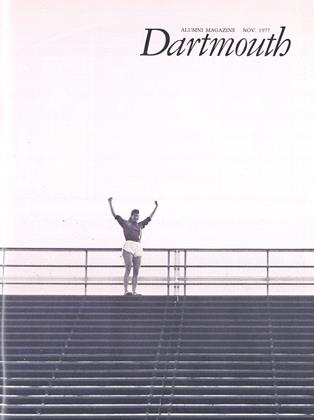This may be a small college, but as of this year it has a university-sized survival manual for students, thanks to the efforts of an assistant dean for student information, a few others from the übiquitous deanery, and a crew of student conscripts. The 165-page, two-volume handbook, modestly purporting to be a "comprehensive guide covering a wide variety of topics," tells you more than everything you need to know about academic requirements, student life, college governance, finances, and life after Dartmouth. (The afterlife section fills two and a half pages.) The informative second volume, a 70-page directory of organizations, committees, and offices, is not only more entertaining than the Alumni Directory, but also considerably easier to read.
If you look through the handbook you'll find that a student needs to complete 11 terms in order to graduate, but that only six of them need to be spent in Hanover, and that of the 33 courses which must be passed, only eight courses passed with a grade of D may be counted. If this seems slightly lax, you'll be reassured to see that there are still requirements for English proficiency, foreign language fluency, distribution of credits in the sciences, social sciences, and humanities, and three terms . of physical education. It may or may not ; surprise you to read that "Dartmouth College believes that familiarity with computers and computing is an essential part of a liberal arts education."
We were surprised to be told that a suspended student "must leave town within 48 hours of being notified ..." (no mention, however, of tar and feathers), that unregistered bicycles may be confiscated and impounded by the Hanover police, that possession of a slingshot will result in an automatic fine of $25 (and possible further disciplinary action), that throwing a snowball could cost $10 in fines, and that the cost of tuition plus three meals a day in Thayer Hall and a room in a place like Lord Hall adds up to $2,259 - for fall term. And we were further enlightened when we read that "the College supplies a limited amount of cleaning equipment for maintaining firearms," that the Hanover Inn and the Dartmouth Dining Association have a monopoly on catering on campus, that fish - but not salamanders or turtles - may be kept as pets in dorm rooms, that students are responsible for any damage caused by waterbeds, and that the standard pay for a part-time job on campus - like washing dishes - is $2.60 an hour.
Students who believe they have been discriminated against will find a description of an established grievance procedure, students having academic difficulties will discover three pages devoted to whom to go to for help, and students involved with drugs may appreciate knowing that "the College relies on its counseling and medical services rather than on disciplinary procedures." Habitues of Webster Avenue, however, may find the section on New Hampshire laws concerning the consumption, transportation, purchase, and manufacture of alcoholic beverages sober reading.
No student handbook would be complete without a brief mention of a few college committees, and this one has them all, including some we'd never heard of. There are 18 committees, in fact, with monikers like CAFA, CAP, CEO, COI, CEP, COCA, COP, CCSC, COSO, COSA, and SAC, not to mention the seven college councils. There are 11 men's dorms listed, four women's dorms, 24 coed dorms, 22 fraternities, and one sorority. The directory of student activities and organizations also lists eight academic clubs, five athletic clubs, seven "media organizations," four occupational clubs, 12 outdoor organizations, two senior societies, two secret senior societies, nine service organizations, five political clubs, eight religious organizations, five special interest clubs, and six student associations
- along with the officers, advisers, meeting locations, mailing addresses, and phone numbers of each. Finally, there is a "College Office Locator" that provides the names and office hours of the staff; there is a list of the members of all the college committees and councils, a list of the "chairpersons" (all male) of the 34 academic departments and programs, a college calendar, and a seven-and-a-half-page index to help you find your way around.
 View Full Issue
View Full Issue
More From This Issue
-
 Feature
FeatureFie on the Flush Toilet
November | December 1977 By Harold H. Leich -
 Feature
FeatureSee How They Run
November | December 1977 By Dan Nelson -
 Feature
FeatureThe Campaign for Dartmouth
November | December 1977 -
 Article
ArticleThe DCMB Double-entendre March
November | December 1977 By Anne Bagamery -
 Article
ArticleDick's House Is Her House
November | December 1977 By S.G. -
 Article
ArticleTheir Fathers' Sons
November | December 1977
Article
-
 Article
ArticlePresidential Sailfish
February 1939 -
 Article
ArticleTrustee-Faculty Agreement
MAY 1971 -
 Article
ArticleTrustee nominations sought
JANUARY/FEBRUARY 1986 -
 Article
Article2015
MAY | JUNE 2016 By —Samantha Webster -
 Article
ArticleEastern Pennsylvania
June 1938 By Charles A. Stickney Jr. '21. -
 Article
ArticleThe D.O.C. and Its Cabin Chain
January 1961 By WILLIAM S. RILEY '63

